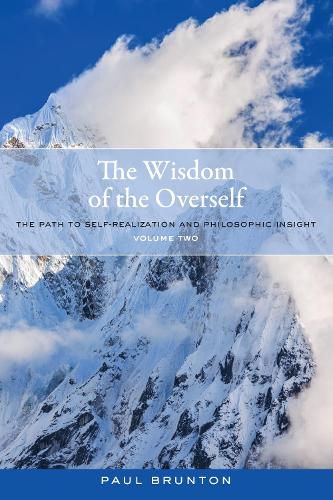
The Wisdom of the Overself: The Path to Self-Realization and Philosophic Insight, Volume 2
Publishing Details
The Wisdom of the Overself: The Path to Self-Realization and Philosophic Insight, Volume 2
By (Author) Paul Brunton
North Atlantic Books,U.S.
North Atlantic Books,U.S.
1st June 2015
United States
Classifications
General
Non Fiction
Self-help, personal development and practical advice
158.1
Physical Properties
456
Width 152mm, Height 227mm, Spine 26mm
689g
Description
This joyously inspiring revelatory work explores the sacred foundation from which our individualities and world(s) emerge. Paul Brunton here presents a grand vision for every human being's possible development by exploring Mind as the source of all consciousness and all experience -- and the continuity of our minds and bodies with that vast Intelligence. He described it as a fresh modern re-creation/synthesis of teachings from sages throughout Asia with whom met, studied, and/or meditated. Main themes include: how to move from ego-centred life to the transcendent reality; the interplay of karma, free will, and grace; the nature of evil and suffering; how to awaken intuition and penetrative insight; the passage through death to rebirth; psychic experiences and mystic visions. Seven "ultramystic exercises" for opening the door to higher consciousness include a healing meditation on the sun; practices for transforming the future, dream, and sleep; and a meditation on the timeless self. This new edition -- now provided as a companion volume with The Hidden Teaching Beyond Yoga, as Paul Brunton originally intended -- has been updated to incorporate his final revisions. It includes a new foreword and supplementary material selected from the authors archives by the Paul Brunton Philosophic Foundation.
Reviews
"[Paul Brunton is] a person of rare intelligence ... thoroughly alive, and whole in the most significant, 'holy' sense of the word."
Yoga Journal
Brunton has penetrated further than many others who are writing in his line. He has touched the heights of overcoming even meditative mysticism and its achievements, as Brunton calls it, in order to arrive at 'philosophy,' by which he means the realization that Yoga is means, not ends. Brunton has successfully avoided any conventional or worn out religious terminologyeven the word 'God' is not used."
Review of Religion, Prof. Frederic Spiegelberg, Stanford University
[Dr. Brunton] is an indefatigable and well-balanced expounder of the half-forgotten thought of the ancient world, and a stimulating guide to those who would be initiated into the Wisdom of the East.
Buffalo News [New York]
Not withstanding the difficulty of the subject presented, it is written in a most lucid manner which could be comprehended by everyone, even if this is their first book on the higher philosophy. Dr. Brunton applies this ancient wisdom to the great philosophical problems which have been cause for inquiry throughout the ages. His analyses are masterly.
Occult Review [London]
Dr. Brunton has made a deep exploration into the metaphysical and has created a work of considerable importance in this present age. The author's message is intended to create a transformation in both mind and body, a mystical asceticism which transcends all personal self-interest.
The Border Standard [England]
Dr. Brunton emphasizes the mystical nature of grace it will be gratifying to many students and practitioners of spiritual life to find it here revived in its own name and proper nature. Dr. Brunton's work has now become a full philosophical system of thought, a definitely modern teaching, in which the ancient Wisdom is transposed for realization by these times.
The Beacon [New York City]
The book is an interesting and clear statement of orthodox Yoga. The virtue of Dr. Brunton's books is their freedom from the usual esoteric decoration. The vocabulary, both verbally and ideologically, is modern and his ideas and expressions thought-provoking.
San Francisco Chronicle
Author Bio
Paul Brunton helps us hear the melody behind the medley of today's "spiritual marketplace." His late writings raise the bar for what we can expect of spiritual teachings and teachers, and what we can do for ourselves. Born in London in 1898, he soon became a leading pioneer of much of what we now take for granted. He traveled widely throughout the world (long before it was fashionable) to meet living masters of various traditions with whom he then lived and studied. His eleven early books from 1934-1952 shared much of what he learned, and helped set the stage for dramatic east-west exchanges of the late 20th century.
